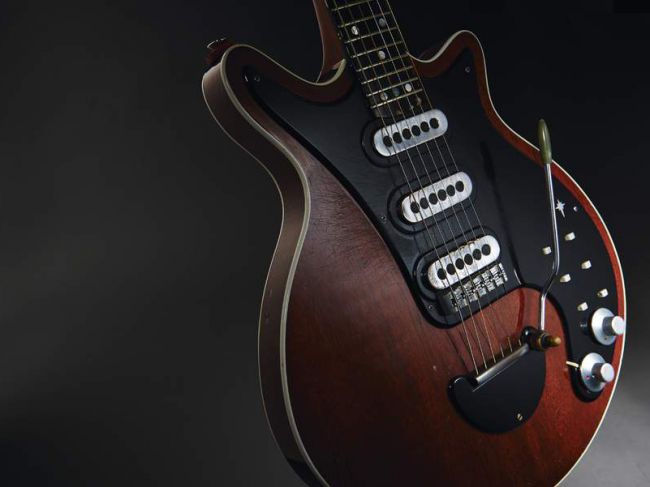Brian May's top 5 tips for guitarists
Plus, Queen guitar icon reveals all about new album, Golden Days

"Riffs: who knows where they come from?”
He may be more than 50 years into a sparkling career, but Brian May admits that his knack for penning iconic guitar lines remains a mystery even to himself.
Somewhat reassuringly for those of us still grappling with the art of writing earworm riffs, May suggests that there is no secret formula that he is hoarding when it comes to creating the kind of magic that he has made a living from since Queen’s inception.
The latest grade-A hook hot off the Brian May production line is found in Roll With You, the lead single from May’s new album Golden Days. The record is the immensely affable guitarist’s latest collaboration with West End star-turned-pop-rock-vocal-powerhouse Kerry Ellis.
“I don’t know where [the Roll With You riff] came from,” he says. “I don’t know where my riffs come from. I was looking for something that I could play interactively with Kerry.
“I thought it would be great to have a riff that was insistent and was challenging Kerry all the way through. That riff just popped into my head. I was consciously searching for something like that, I think, but where these things come from I don’t really know. You hear it in your head first and you try to play it. Riffs: who knows where they come from?”
You won’t just find new material on Golden Days; there’s also a smattering of covers, including a reworking of Gary Moore’s Parisienne Walkways.
“I was asked to do a tribute to Gary Moore, and Parisienne Walkways hadn’t been chosen by anybody else - I thought that would be a great track for me because it is very lyrical,” May explains.
“I was always a great admirer of Gary. What we did was more or less recreate the track in a way that was not too dissimilar to the way it had been recorded before, but I also wanted to design it in a way that would suit Kerry and made sure it was in the right key for Kerry.
I thought it would be great to have a riff that was insistent and was challenging Kerry all the way through. That riff just popped into my head
“It was a bit of a step into the dark because I don’t think anyone had ever considered it to be a woman vocalist’s song before, but as soon as you hear Kerry come in on that vocal it sounds so natural but also so different. That was great. A lot of things fall into our laps and that was one of them.”
It may have landed in the laps, but it quickly became a track that defined the very make-up of Golden Days.
“It’s nice also, because [Parisienne Walkways] was the pivotal place where we decided that this album had to be myself and Kerry together rather than just Kerry’s album, as the guitar is the principle voice on that track. That song really works well for us in terms of it being a partnership.”
May and Ellis may have been re-interpreting some classic tracks on Golden Days, but when it came to gear, the 69-year-old wasn’t reinventing the wheel.
“With gear, I am the same as I always was,” he says. “I haven’t changed that much in 40 years, really. I had an AC30 and a treble booster and my own guitar that I made with my dad. That is my sound most of the time.
“I don’t really like to use many effects. I use delay for certain things, but mostly on this album I don’t think there is any trickery at all. I just like to go in and play.”
That unmistakable Brian May approach to tracking guitar also remains reassuringly intact throughout the record.
“I like to regard my guitar as a voice really that stands beside Kerry and that has always been my way,” he explains.
“If you listen to We Are The Champions, the guitar is the second voice on that, and I remember Freddie very distinctly with his hand pushing up the fader on my guitar for the last chorus. Even I was thinking if it was a little too much, but he said it was the voice that was fighting with his, and it was essential that it was there. That’s how I view guitar.
“Guitar can do lots of stuff: it can make the nice background, it can make a nice rhythm bed for things to lie on. But, the guitar of the last 50 years or so, post-Hendrix, is a voice which demands to be heard in the same way that a human voice demands to be heard.”
Some sage words from a genuine icon right there. And he didn’t stop at that; Brian has a wealth of sage advice to share, as he reveals his top five tips for guitarists. Read on and learn…
Golden Days is out now.

1. Find a musical partner
“I think part of staying fresh [in your guitar playing] is about surrounding yourself with people that you are inspired by.
“You could easily go away into a corner and get lost. It is good to be in the world. I was very fortunate to find Kerry. If nothing else, working with Kerry is a fantastic vehicle for a song. You couldn’t wish for better. She is someone that can bring her own interpretations to stuff and she is interactive. That has been great for me.
I’m not sure if I would be still writing had I not met and worked with Kerry...
“I’m not sure if I would be still writing had I not met and worked with Kerry and been challenged to come up with arrangements and material.
"It is very hard not having Freddie around, still. That is because Freddie was an amazing person to interact with. He would always be coming up with ideas and always challenging and flying off in all kinds of different directions. It was very lateral thinking. Of course, he was the greatest possible vehicle for a song, if you want to call it that. I have been very lucky.”

2. Turn recording into a live performance
“My guiding light in the studio as far as performance is that you have to get yourself somehow in the state of mind where you feel like it is a live performance.
“If you are thinking about, ‘I have to come in here, I have to stop here, I have to be in tune, I have to be in time,’ then you are never going to get that feeling.
“You have to somehow throw your brain somewhere else where you are just there are you’re performing. You might be in the middle of an arena or anywhere but you have to throw yourself into that place where you’re just performing.
“That is the purity of recording: you’re letting whatever is inside you speak and you’re speaking out to the people out there. That is the trick of making a studio recording come to life: you have to have that imagination.”

3. Sing your solos
“My advice for anyone writing a solo would be to sing it in your head. You should be able to hear it in your head before you start to play.
“Don’t just pick up the guitar. Think about it and feel it first. You should visualise how you would like it to sound. That also gives you something to work towards.”

4. Always think of the vocals
“As a guitarist, you can go so far, but I have never thought that the guitar is the most important thing on most records.
“It is the singer and the song that is important. The guitar helps, of course. I am generally much more excited about the rest of the song than I am about the guitar part. The guitar usually gets put on at the last minute and it gets done in 10 minutes quite spontaneously.
I am generally much more excited about the rest of the song than I am about the guitar part
“The challenging part is the arrangement and making sure the vocal sits in the song properly and making sure that the vocal is highlighted.
“Also, if you are a producer you need to make sure that your singer is feeling comfortable and that they can forget about the constraints of a studio. Putting a track together in the studio is a fantastic jigsaw puzzle that you have to put together.”

5. Believe in yourself… and each other
“The thing you have to have is belief. You have to believe in yourself. That needs examining every now and then.
“Basically, you need to work with people that you like and people who believe in you, and you need to believe in them. That is the key. You can’t work in a vacuum.
“You certainly can’t go on tour with people that you don’t believe in and that you don’t like. Well, you can, but it will be a disaster.
“I’ve been so lucky that I have had some great people to tour with and work with in the studio.”
Rich is a teacher, one time Rhythm staff writer and experienced freelance journalist who has interviewed countless revered musicians, engineers, producers and stars for the our world-leading music making portfolio, including such titles as Rhythm, Total Guitar, Guitarist, Guitar World, and MusicRadar. His victims include such luminaries as Ice T, Mark Guilani and Jamie Oliver (the drumming one).

